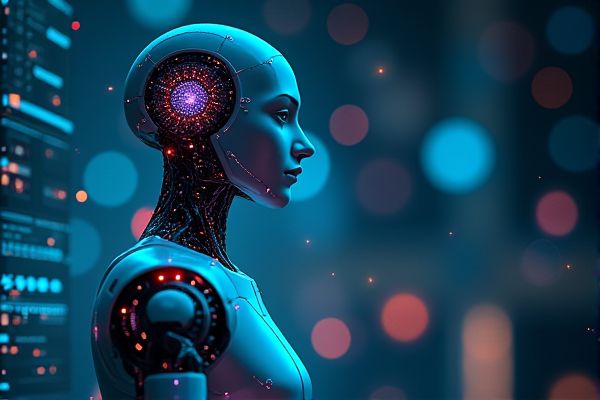
AI streamlines the recruitment process by automating repetitive tasks such as resume screening and interview scheduling, allowing HR professionals to focus on strategic decision-making. Machine learning algorithms analyze candidate data to identify the best fits for specific roles, enhancing the quality of hires. Predictive analytics provide insights into candidate performance and retention, helping organizations make informed hiring choices. Implementing AI tools can significantly reduce time-to-hire and improve overall candidate experience through personalized communication and engagement.
AI usage in human resource recruitment
Automated Screening
Automated screening can enhance the efficiency of human resource recruitment by quickly evaluating a large pool of candidates. AI algorithms can analyze resumes and predict which candidates possess the skills required for specific Job Names, leading to more informed hiring decisions. This technology reduces the time spent on manual evaluations, allowing HR professionals to focus on engaging with potential hires. Companies that adopt automated screening may gain a competitive advantage in attracting top talent.
Bias Reduction
AI tools can enhance human resource recruitment by providing unbiased screening processes. For example, an institution like IBM employs AI algorithms to analyze resumes and match candidates based on skills rather than demographic factors. This approach can reduce the likelihood of unconscious bias, making it possible for a more diverse pool of applicants to be considered. The potential advantage lies in improving overall workplace diversity and ensuring talent is selected based solely on merit.
Candidate Matching
AI can significantly enhance candidate matching in human resource recruitment by analyzing resumes and job descriptions to identify the best fits. For instance, an AI system can evaluate a candidate's skills against the requirements of a Data Analyst position at a tech firm. This streamlined process not only saves time but also increases the likelihood of selecting qualified candidates. Ultimately, implementing AI technology can lead to a more efficient hiring process and improved employee retention rates.
Interview Scheduling
AI can streamline the recruitment process by automating resume screening, allowing for quicker identification of qualified candidates. Tools like Applicant Tracking Systems (ATS) leverage AI to reduce bias and improve the fairness of hiring decisions. Interview scheduling can also benefit from AI, as platforms can coordinate availability and send reminders to both candidates and interviewers efficiently. Organizations that adopt AI in these areas may gain a competitive edge through enhanced productivity and improved candidate experiences.
Resume Parsing
Resume parsing can significantly streamline the recruitment process by automatically extracting relevant candidate information, reducing manual screening efforts. Tools like HireVue utilize AI algorithms to assess skills and qualifications, potentially leading to more efficient candidate selection. This technology can enhance the matching process between job descriptions and resumes, increasing the likelihood of finding suitable candidates. Overall, the implementation of AI in resume parsing presents a considerable chance to optimize hiring outcomes for institutions.
Talent Pool Analytics
AI in human resource recruitment can improve the efficiency of candidate sourcing by using algorithms to identify potential talent. For example, companies like IBM utilize Talent Pool Analytics to analyze data from various sources and predict candidate success. This technology allows HR teams to focus on high-potential candidates, thus optimizing the selection process. By leveraging AI, organizations may enhance their recruitment outcomes and reduce time-to-hire.
Predictive Analytics
AI usage in human resource recruitment can streamline the selection process, improving efficiency in identifying suitable candidates. Predictive analytics allows organizations to analyze past hiring data to forecast future recruitment needs, which can lead to better hiring decisions. For example, a company like Google employs AI tools to enhance its recruitment strategies by predicting candidate success. This technology offers a chance to reduce bias and enhance the overall candidate experience, fostering a more diverse workforce.
Skill Assessment
AI can enhance human resource recruitment by automating the initial screening of resumes, potentially reducing bias. Tools that utilize machine learning can assess candidates' skills through simulations or interactive assessments. This approach allows organizations to focus on the most qualified applicants, improving the quality of hires. For instance, a company like LinkedIn offers AI-driven tools that can predict candidate success based on skills and experience.
Decision Support
AI usage in human resource recruitment can streamline the hiring process by analyzing candidate data effectively. Tools like applicant tracking systems serve as examples of how AI can enhance decision support through data-driven insights. Predictive analytics may identify top candidates based on historical hiring data. This could lead to reduced time-to-hire and improved employee fit within the organization.
Diversity Enhancement
AI can analyze large volumes of candidate data to identify diverse talent pools, increasing the chances of building a more inclusive workforce. By implementing tools like automated resume screening, organizations can reduce unconscious bias in the hiring process. Companies such as Google have leveraged AI to improve their recruitment strategies, emphasizing the potential for greater diversity. The possibility of AI-driven insights may lead to more equitable hiring practices and enhanced organizational culture.
 techknowy.com
techknowy.com